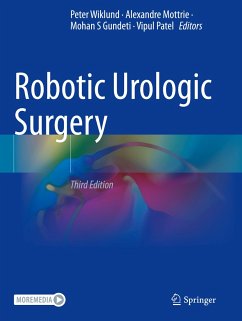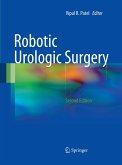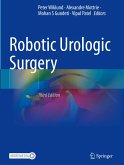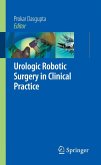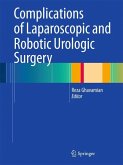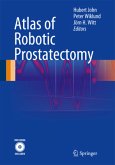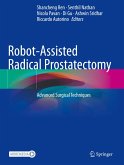Robotic Urologic Surgery
Herausgegeben:Wiklund, Peter; Mottrie, Alexandre; Gundeti, Mohan S; Patel, Vipul
Robotic Urologic Surgery
Herausgegeben:Wiklund, Peter; Mottrie, Alexandre; Gundeti, Mohan S; Patel, Vipul
- Broschiertes Buch
- Merkliste
- Auf die Merkliste
- Bewerten Bewerten
- Teilen
- Produkt teilen
- Produkterinnerung
- Produkterinnerung
This heavily revised third edition gives an essential textbook which provides a comprehensive guide to robotic surgical techniques in urology. Extensively updated chapters cover general aspects of surgery such as aspects of operating room preparation and anesthesia. Instructions on how to use a variety of the latest techniques for procedures associated with the kidney, prostate, bladder and testicle are covered. Detailed information on how to improve outcomes, avoid potential complications and pitfalls is also provided. Instructive video clips assist the reader in being able to visualize how…mehr
Andere Kunden interessierten sich auch für
![Robotic Urologic Surgery Robotic Urologic Surgery]() Robotic Urologic Surgery91,99 €
Robotic Urologic Surgery91,99 €![Robotic Urologic Surgery Robotic Urologic Surgery]() Robotic Urologic Surgery90,99 €
Robotic Urologic Surgery90,99 €![Urologic Robotic Surgery in Clinical Practice Urologic Robotic Surgery in Clinical Practice]() Urologic Robotic Surgery in Clinical Practice38,99 €
Urologic Robotic Surgery in Clinical Practice38,99 €![Complications of Laparoscopic and Robotic Urologic Surgery Complications of Laparoscopic and Robotic Urologic Surgery]() Complications of Laparoscopic and Robotic Urologic Surgery113,99 €
Complications of Laparoscopic and Robotic Urologic Surgery113,99 €![Atlas of Robotic Prostatectomy Atlas of Robotic Prostatectomy]() Hubert John / Peter Wiklund / Jorn H. Witt (Hrsg.)Atlas of Robotic Prostatectomy38,99 €
Hubert John / Peter Wiklund / Jorn H. Witt (Hrsg.)Atlas of Robotic Prostatectomy38,99 €![Urologic Prostheses Urologic Prostheses]() Culley C. III Carson (ed.)Urologic Prostheses170,99 €
Culley C. III Carson (ed.)Urologic Prostheses170,99 €![Robot-Assisted Radical Prostatectomy Robot-Assisted Radical Prostatectomy]() Robot-Assisted Radical Prostatectomy90,99 €
Robot-Assisted Radical Prostatectomy90,99 €-
-
-
This heavily revised third edition gives an essential textbook which provides a comprehensive guide to robotic surgical techniques in urology. Extensively updated chapters cover general aspects of surgery such as aspects of operating room preparation and anesthesia. Instructions on how to use a variety of the latest techniques for procedures associated with the kidney, prostate, bladder and testicle are covered. Detailed information on how to improve outcomes, avoid potential complications and pitfalls is also provided. Instructive video clips assist the reader in being able to visualize how to enhance their methodologies further.
Robotic Urologic Surgery is a detailed up-to-date resource that includes contributions from leading robotic urologic surgeons from around the world. It assists readers in refining their surgical technique and improving their patient care. Therefore, it is a critical resource for all practicing and trainee physicians involvedin the care of these patients.
Hinweis: Dieser Artikel kann nur an eine deutsche Lieferadresse ausgeliefert werden.
Robotic Urologic Surgery is a detailed up-to-date resource that includes contributions from leading robotic urologic surgeons from around the world. It assists readers in refining their surgical technique and improving their patient care. Therefore, it is a critical resource for all practicing and trainee physicians involvedin the care of these patients.
Hinweis: Dieser Artikel kann nur an eine deutsche Lieferadresse ausgeliefert werden.
Produktdetails
- Produktdetails
- Verlag: Springer / Springer International Publishing / Springer, Berlin
- Artikelnr. des Verlages: 978-3-031-00648-7
- 3. Aufl.
- Seitenzahl: 920
- Erscheinungstermin: 2. Oktober 2023
- Englisch
- Abmessung: 279mm x 210mm x 36mm
- Gewicht: 2461g
- ISBN-13: 9783031006487
- ISBN-10: 3031006488
- Artikelnr.: 68848700
- Herstellerkennzeichnung Die Herstellerinformationen sind derzeit nicht verfügbar.
- Verlag: Springer / Springer International Publishing / Springer, Berlin
- Artikelnr. des Verlages: 978-3-031-00648-7
- 3. Aufl.
- Seitenzahl: 920
- Erscheinungstermin: 2. Oktober 2023
- Englisch
- Abmessung: 279mm x 210mm x 36mm
- Gewicht: 2461g
- ISBN-13: 9783031006487
- ISBN-10: 3031006488
- Artikelnr.: 68848700
- Herstellerkennzeichnung Die Herstellerinformationen sind derzeit nicht verfügbar.
Vipul Patel, MD, FACS completed his medical school education at Baylor College of Medicine in Houston, TX. He then completed his residency and fellowship training at the University of Miami in Florida. Subsequently, Dr. Patel served as director of the Robotic Surgery Program at The Ohio State University in Columbus, Ohio, prior to joining Advent Health Celebration. Dr. Patel is board certified by the American Urological Association and is the medical director of the Global Robotics Institute at Advent Health Celebration and medical director of the Advent Health Cancer Institute Urologic Oncology Program. He is a professor of Urology at the University of Central Florida College of Medicine in Orlando, Florida, and a clinical associate professor of Urology at Nova Southeastern University, also in Orlando. He serves as an honorary professor at the University of Milan, Korea University and Ricardo Palma University in Lima, Peru, and was recently made an honorary professor of the Russian Academy of Science. He is the founder of the International Prostate Cancer Foundation (IPCF) and a founding member of the Society of Robotic Surgery. He is the editor emeritus of The Journal of Robotic Surgery and editor of the first-ever robotic urology textbook. Dr Patel was also named to the Stanford University/Elsevier Publishing top 2% of scientists in the world in 2021. He leads one of the world's most experienced robotic surgery teams and travels around the world to educate physicians and care for patients. Dr. Patel is world-renowned for his contribution to the field of robotic surgery and prostate cancer. Dr Patel is the most experienced robotic surgeon in the world and has personally performed nearly 16,000 robotic prostatectomies for the treatment of prostate cancer. Dr. Patel has developed techniques in robotic surgery that have translated to improve patient care and outcomes. His innovations have helped to improve cancer treatment and return of early urinary continence and sexual function. His contributions have been recognized worldwide through publications, professorships and training courses. He has traveled the globe lecturing and teaching. He has educated thousands of surgeons in robotic surgical techniques. He has started robotic surgery programs or performed surgery throughout the United States and in countries, including India, China, England, Sweden, Belgium, Turkey, Australia and South Korea. He currently serves as a past president of the Florida Urologic Society and past president and Managing Director of the Society of Robotic Surgery.
General aspects of Robotic Surgery.- Robotic surgery evolution (2000-SP) and new robotic platforms.- How to implement a successful multidisciplinary robotic program.- Robotic training and certification.- Complications in robotic surgery.- Preparation of the operating room, back table, and surgical team.- Role of the tableside assistant in robotic surgeries.- Anesthesia in robotic surgeries. (our experience with TAP block).- Robotic surgery management in oncologic patients during pandemic and challenging scenarios.- Prostate.- Prostate cancer screening and trends in the last 15 years (TASK force paper).- Current Imaging exams to access prostate cancer.- Current protocols and technologies in Prostate cancer biopsy.- Prostate anatomy and concepts to improve RARP outcomes.- Trocar placement and challenges during the peritoneal access.- Intraoperative technologies.- Current techniques to perform a RARP.- RARP in a high volume center and step-by-step technique (Patel's technique).- SinglePort approach to radical prostatectomy.- Retzius sparing technique.- Extraperitoneal RARP.- Lymphadenectomy in prostate cancer: technique and outcomes.- Robotic-assisted Salvage Prostatectomy.- Challenges during RARP.- Functional and oncological outcomes following RARP.- Managing complications during a RARP.- How to maximize the penile rehabilitation following a RARP.- Robotic approach to BPH disease.- Kidney, adrenals, and ureter.- Renal anatomy, physiology and its clinical relevance to nephrectomy.- Training and challenges to perform robotic-assisted kidney surgeries.- Robotic-assisted radical nephrectomy and nephroureterectomy.- Robotic-assisted Partial nephrectomy.- Challenges and robotic approach to nephrectomy with Vena Cava thrombus.- Outcomes of robotic radical and partial nephrectomy.- Single port approach to kidney surgery.-Current status of Robotic-assisted pyeloplasty in adults.- The role of robotics for adrenal surgery.- Robotic surgery techniques in ureteral reconstruction and implantation.- Current application of robotic surgery in kidney transplants.- Complications and management in robotic-assisted kidney surgeries.- Bladder.- Surgical anatomy and different aspects to optimize outcomes in robotic- assisted cystetomies.- Step-by-step approach to robotic cystectomy and intracorporeal urinary diversion.- Step-by-step approach to robotic cystectomy and extracorporeal urinary diversion.- Urinary diversion following a radical cystectomy: techniques and outcomes.- Lymph node dissection in bladder cancer surgery: step-by-step technique and outcomes.- Complications after robot-assisted radical cystectomy.- Robotic-assisted radical cystectomy outcomes.- Robotic surgery applications for benign bladder diseases.- Robotic-assisted surgery in urinary fistulas (vesicorectal, vesicovaginal, ureterovaginal).- Complications in robotic- assisted bladder surgery: preventions and management.- Pediatric surgery.- Robotic surgery application in urologic pediatric patients.- Robotic surgery of the kidney and ureter in the pediatric population.- Robotic surgery to approach bladder disorders in pediatric patients.- Penile.- RAIL technique and outcomes for penile cancer.- Testicle.- Retroperitoneal lymphadenectomy technique and outcomes for testicle cancer.
General aspects of Robotic Surgery.- Robotic surgery evolution (2000-SP) and new robotic platforms.- How to implement a successful multidisciplinary robotic program.- Robotic training and certification.- Complications in robotic surgery.- Preparation of the operating room, back table, and surgical team.- Role of the tableside assistant in robotic surgeries.- Anesthesia in robotic surgeries. (our experience with TAP block).- Robotic surgery management in oncologic patients during pandemic and challenging scenarios.- Prostate.- Prostate cancer screening and trends in the last 15 years (TASK force paper).- Current Imaging exams to access prostate cancer.- Current protocols and technologies in Prostate cancer biopsy.- Prostate anatomy and concepts to improve RARP outcomes.- Trocar placement and challenges during the peritoneal access.- Intraoperative technologies.- Current techniques to perform a RARP.- RARP in a high volume center and step-by-step technique (Patel's technique).- SinglePort approach to radical prostatectomy.- Retzius sparing technique.- Extraperitoneal RARP.- Lymphadenectomy in prostate cancer: technique and outcomes.- Robotic-assisted Salvage Prostatectomy.- Challenges during RARP.- Functional and oncological outcomes following RARP.- Managing complications during a RARP.- How to maximize the penile rehabilitation following a RARP.- Robotic approach to BPH disease.- Kidney, adrenals, and ureter.- Renal anatomy, physiology and its clinical relevance to nephrectomy.- Training and challenges to perform robotic-assisted kidney surgeries.- Robotic-assisted radical nephrectomy and nephroureterectomy.- Robotic-assisted Partial nephrectomy.- Challenges and robotic approach to nephrectomy with Vena Cava thrombus.- Outcomes of robotic radical and partial nephrectomy.- Single port approach to kidney surgery.-Current status of Robotic-assisted pyeloplasty in adults.- The role of robotics for adrenal surgery.- Robotic surgery techniques in ureteral reconstruction and implantation.- Current application of robotic surgery in kidney transplants.- Complications and management in robotic-assisted kidney surgeries.- Bladder.- Surgical anatomy and different aspects to optimize outcomes in robotic- assisted cystetomies.- Step-by-step approach to robotic cystectomy and intracorporeal urinary diversion.- Step-by-step approach to robotic cystectomy and extracorporeal urinary diversion.- Urinary diversion following a radical cystectomy: techniques and outcomes.- Lymph node dissection in bladder cancer surgery: step-by-step technique and outcomes.- Complications after robot-assisted radical cystectomy.- Robotic-assisted radical cystectomy outcomes.- Robotic surgery applications for benign bladder diseases.- Robotic-assisted surgery in urinary fistulas (vesicorectal, vesicovaginal, ureterovaginal).- Complications in robotic- assisted bladder surgery: preventions and management.- Pediatric surgery.- Robotic surgery application in urologic pediatric patients.- Robotic surgery of the kidney and ureter in the pediatric population.- Robotic surgery to approach bladder disorders in pediatric patients.- Penile.- RAIL technique and outcomes for penile cancer.- Testicle.- Retroperitoneal lymphadenectomy technique and outcomes for testicle cancer.

